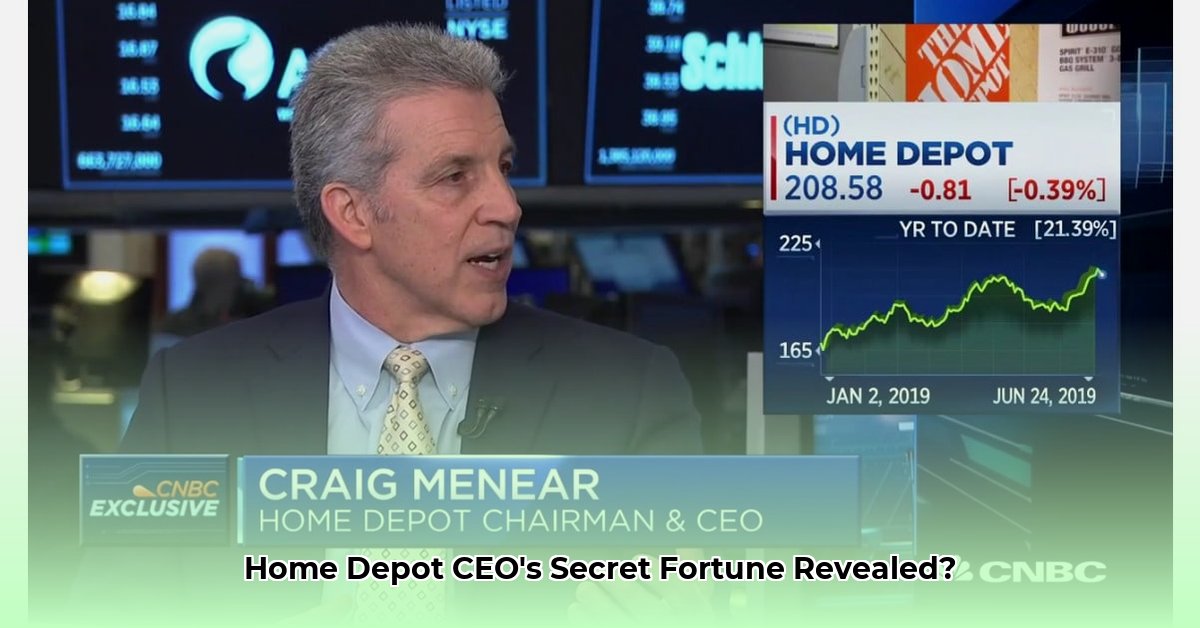
Craig Menear's leadership of The Home Depot has coincided with significant company growth, leading many to wonder about his personal wealth. However, precisely determining his net worth proves challenging, as it's a complex calculation involving several factors beyond his publicly disclosed salary and stock options.
Deconstructing Craig Menear's Financial Picture
Estimating the net worth of a high-profile CEO like Craig Menear isn't a simple matter of adding up publicly available figures. While his compensation package—including salary and stock options—is partially transparent through SEC filings, a significant portion of his wealth remains private. This includes personal investments, real estate holdings, and other assets not subject to public disclosure.
The Home Depot's Ascent and Menear's Role
The Home Depot's success during Menear's tenure is undeniable, impacting his personal wealth significantly. His compensation is not just about his salary; it reflects his role in the company's substantial growth and ongoing market value. But how much of this growth translates directly into his personal net worth? That's the key question. Isn't it fascinating how a CEO's leadership directly ties to their financial success within such a massive enterprise?
Public vs. Private Wealth: The Missing Pieces
Public records provide insight into Menear's salary and stock options, offering a glimpse into a significant, but incomplete, portion of his financial portfolio. However, a substantial amount of his wealth originates from undisclosed sources. This includes any personal investments, real estate assets, or other private holdings. These assets contribute significantly yet remain beyond the reach of public scrutiny. Therefore, we must acknowledge that any net worth estimate involves a degree of educated speculation. This complexity makes a precise calculation elusive.
Key Components of Craig Menear's Wealth
While a precise figure remains elusive, several key factors contribute to Craig Menear's substantial wealth:
- Salary and Bonuses: His annual compensation, comprising a base salary and performance-based bonuses, forms a substantial portion of his income. However, it represents only a fraction of his overall net worth.
- Stock Options: A substantial portion of his wealth is likely tied to stock options awarded through his position at The Home Depot. The fluctuating value of these options, directly impacted by the company's stock performance, plays a significant role in his overall wealth.
- Undisclosed Assets: This category includes private investments, real estate holdings, and other assets not subject to public disclosure. These are significant but remain unknown quantities.
Comparing Menear's Compensation to Industry Peers
Interestingly, research points to some CEOs leading similarly large and successful companies earning considerably more than Menear. Several factors could account for this discrepancy. These include varying compensation structures, differing tenures, and personal financial strategies. For example, Menear's package might be weighted more heavily towards stock options, whereas others receive larger salaries with fewer stock benefits.
The Impact of CEO Compensation on Brand Value
Understanding CEO compensation requires a broader perspective, considering its impact on brand value and stakeholder relations. High CEO compensation can negatively affect consumer perception, especially during periods of economic uncertainty or brand crises. Consumers may view excessively high salaries as a misallocation of resources. Conversely, transparent and performance-aligned compensation builds stakeholder trust which, in turn, strengthens brand equity.
The Home Depot's Brand and Menear's Role
The Home Depot's brand strength is a result of long-term strategy, effective leadership, and positive customer experiences. How Menear's compensation is perceived affects this brand strength. Was his package fair? Did it align with company performance? These are important considerations in understanding the full picture. The perception of fairness is key; a perceived imbalance between executive pay and employee compensation, or company performance, can negatively influence consumer behavior and brand loyalty.
Considering the Wider Stakeholder Landscape
The impact of CEO compensation extends beyond shareholders. Employees, customers, and the community are affected. Does the compensation reflect a commitment to equitable treatment across the organization? Does it align with environmental, social, and governance (ESG) principles? A perceived lack of fairness can erode trust amongst all stakeholders, impacting brand value.
A Delicate Balance: Growth and Responsibility
Successful companies navigate the complexities of CEO compensation by attracting and retaining top talent while ensuring practices are viewed as responsible and ethical. Transparency is key. Open communication regarding compensation decisions mitigates negative perceptions and fosters positive stakeholder relations.
In conclusion, determining Craig Menear's precise net worth remains speculative due to the absence of full public disclosure. However, considering The Home Depot's success under his leadership, his wealth is undoubtedly substantial. The complete picture requires more than just publicly available data, and understanding the broader context of CEO compensation and its impact on a brand’s value provides a richer narrative.